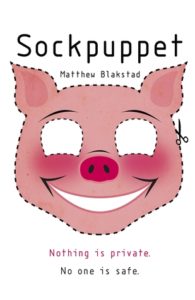

Sockpuppet (Hodder and Staughton 19th May) is a brilliant thriller, you can see a link to my review below, so I was delighted to get to dig a little deeper and find out more about it from the author himself. HUGE thanks to him for his terrific answers – fascinating stuff.
Lots of very topical issues in Sockpuppet – but lets start with the important stuff, giggly pigs. They pop up everywhere I’m interested in why pigs. And giggly ones at that. There must be a story within a story there?
Ha! Yes, indeed. An important theme in Sockpuppet is that these days the media are so noisy that only the shiniest, flashiest events grab our attention. We shout about something for thirty seconds, then drop it move on to the next fleeting hoo-hah. In the book, the well-meaning politician Bethany Lehrer is hauled over the coals for some bad choices she’s made in power; but this only becomes a public sensation because she’s being blamed for infecting thousands of people’s PCs with a family of unbelievably annoying children’s’ TV characters called the Giggly Pigglies. People find this hilarious, and it immediately becomes a wildly popular meme called ‘piggate’.
So I had the fun challenge of inventing some cartoon characters that could come across as suitably cute, while also providing a suitable emblem for TakeBack, the anti-corporate protest movement that picks up the meme and turns it into something more threatening. The Giggly Pigglies perfectly fitted this bill. Piglets are certainly cute, but they also carry associations of greedy officials with their ‘noses in the trough’. The pig masks worn by my protesters are brilliantly brought to life in Ben Summers’ arresting cover design. They’re my equivalent of the Guy Fawkes masks worn by the real-life hactivist movement, Anonymous.
Still, I never expected all this Giggly Piggery to find a counterpart in the real world. Then last autumn, just before we revealed the cover for the book, allegations came to light about David Cameron and what he – ahem! – may or may not have done to a pig’s head while he was a student. About which the less said the better. But, as we saw, Twitter quickly started calling the affair ‘Piggate’ – just like the scandal in the book – and anti-austerity protestors even started donning pig masks. This is one of a number of elements of Sockpuppet that have unexpectedly leaked out into the real world! I wrote about this weirdness at the time, on my blog.
Onto more serious matters, Sockpuppet speaks to a very topical social issue at the moment – that of privacy in the digital age. It is something that people think about without really THINKING about it. Talk a little about your motivation in writing a (very excellent and entertaining) story about this subject.
Thank you!
I think you’ve put it really well in your question: we’re increasingly aware they we’re giving up our privacy, but we’re not thinking about the consequences. And the big problem is, we’re never getting it back. Maybe someone once posted a picture of me being inappropriate at a party. Once it’s out there, it’s never going away, and it can be copied and shared an indefinite number of times. (Thinking about it, isn’t David Cameron lucky that Facebook wasn’t around when he allegedly attended that student party back in the 80’s?)
Anyway, it’s just the same with all our other data. Maybe we provide it to an organisation we trust – but of course they can simply sell it on to people who sell it on to yet other people; until it ends up in the hands of people we’d really rather didn’t know our income, address, medical conditions, and mother’s maiden name… Again, though, we’re never getting it back.
I didn’t want to lecture people about this. I don’t think that’s helpful. What I wanted to do in writing the book was bring these issues to life in the context of a story that would grip the reader, where bad things happen to characters they’ve grown to care about. And so, perhaps, encourage people to think about this stuff.
In some ways it is very insidious. Take cookies for example. I have a new appreciation about that. Cookies sound so tasty but in computer terms they follow you around and get a picture about your lifestyle and choices right? Which is used to advertise but surely could be used for more nefarious purposes. See? You’ve made this reader think about these things…
Great – one down, 64 million to go!
But you’re right. We’ve got it in our heads that the services we use on our smartphones are free; whereas in fact we’re paying through the nose for them, if you consider the valuable data we hand over when we use them. The problem is, we’ve never had to put a price tag on our data, because in the pre-smartphone age, there wasn’t any way for businesses – or criminals – to capture and use them in such incredible volumes as they do today. So we blithely go on sharing – and the more we share, the more we get these tiny rewards. Retweets, upvotes, user ratings… All these things give us little hits of pleasure and make us want to share still more. The psychology of these services is very subtle and advanced.
If we sat back and thought – hey, I’m giving up my time, to populate Facebook and Twitter and TripAdviser with the very content that attracts new users to their services; PLUS they’re getting incredibly valuable personal information about me; PLUS they’re tracking my behaviour and learning how better to sell to me in future – if we added all this up, we might think the deal looks a bit one-sided. But it’s easy to forget this when the stuff we surrender is invisible, and when it’s stored in some abstract space out there in the ‘cloud’.
And even if the company we’re giving data to has no intention of misusing it, rest assured they’ll almost certainly be hacked at some point, by people with less noble motives. Again, this is something I bring out in the book. The biggest, most secure companies on the planet are also the biggest targets for criminal hackers. We just can’t win!
Tell me about Dani and Bethany. Two very different women who come together with a single purpose but very differing motivations. Were they fun to write? Especially Dani who I loved for her witty incisiveness.
Dani was alarmingly fun to write – though I think I’d be terrified if I met her in real life! She’s the wicked imp inside us all. The one who says and does things without any internal censor holding her back. She’s a kind of personification of online culture. She’s completely out there – sharing for her is as natural as breathing. She’s rude, quick, witty and sexually wide open. She’s also way more vulnerable than she’d like the world to think. And, like most good techies, she’s incredibly impatient with ordinary people’s lack of understanding of her world; and very judgemental about their intelligence. But she’s passionate, and good, and quick to fight for the things she believes in.
Bethany, the government minister, is quite a contrast. She’s older than Dani, more measured, more compromised by the realities she’s experienced, climbing the greasy pole of politics. She’s messed up more than once along the way; as have we all, I guess. Still, she too has a powerful moral core. She wants to make things better for everyone, and she believes that government is the only force that can make that happen. But she hasn’t yet worked out how far she’s prepared to compromise to further her goals.
I’m often asked if it was a deliberate tactic, making both my main protagonists women. And it really wasn’t. These are characters who, as I was developing the book, just insisted on being written. I’m delighted the book has ended up with such a strongly female point of view, though. I think it would have been very different if it was fronted up by yet another Male Hero Hacker. After all, it’s women who get the brunt of the Internet’s dark side. I found there was more conflict and drama in pitting two women against these forces. My (female) editor recently told me it’s a feminist book and that was extremely gratifying to hear; but I didn’t set out to make it one. When a man tries to do that it can end up horribly mansplainy. But in this case the feminist themes come from the characters and their stories: two strong but all-too human women, fighting their corners in an overwhelmingly male environment.
Sticking with characters for a moment, how about the wider cast. Any favourites in there? Any that gave you a headache?
It’s quite a big supporting cast, and I enjoyed writing them all. But a personal favourite is J-R Pemberton, the brilliant but hapless political advisor who during the book is working through some major questions about both his sexuality and his career. He’s based on some of the young political wonks I’ve met while working for government departments: utterly brilliant, super-knowledgeable, but totally out of touch with the real world. He’s very different from me in many ways but he shares my tendency to overthink things, and my infuriating clumsiness. Some of his mishaps, including a pivotal scene where he drops his Party BlackBerry in the loo, have a grounding in my own minor catastrophes!
Probably the character it took me longest to learn to understand was the ruthless tech entrepreneur, Sean Perce. I came to love writing him but at first I found it hard to inhabit the mind of this single-minded, passionate businessman who’s absolutely certain that he’s destined to change the world. This is a trait I think is shared by all the top people in tech – Mark Zuckerberg, Elon Musk and so on. I haven’t got an ounce of those guys’ self-confidence; but I find them fascinating and compelling. And likewise, many of my characters find themselves drawn into Sean’s orbit, by the sheer force of his personality.
It is a geek’s dream novel when it comes to technological wizardry – are you a computer genius or did you get a lot of help on the detail? In fact tell us a little about your background…
I’m no computer genius, but I do have an affinity with the things. I think I’m a bit of a hybrid – half human being, half nerd. A kind of geek Mr Tumnus, you might say! I’m old enough that my first computer was the kind you could only talk to by typing in commands. Way before Windows and the Mac built their friendly layers of user interface over the technology. This left me with an intuitive sense of how these humming beasts tick. So although Dani would think I’m a dilettante know-nothing, I have some insight into my technically gifted characters.
At the same time, though, I hope I’ve also maintained an outsider’s perspective. I don’t want to write books that can only be read by geeks. One of the really gratifying thing about the early response to Sockpuppet is that people who are put off by tech – if not actively afraid of it – have found it an illuminating and engaging way into this world.
This is the start of a series – are you allowed to/can you tell us anything about what will come next, in very general terms?
I can drop a few tantalising hints! Sockpuppet kicks off a series called The Martingale Cycle, which explores the life – and afterlife – of a political radical and computing pioneer called Elyse Martingale. I’ve called it a ‘cycle’ because it’s not a continuous serial. Each title in the series will be a self-contained novel. You can read them in any order but the more of the stories you read, the more you’ll piece together an alternative history of our love-and-hate affair with computers, and of the use of technology for power and protest. Eventually I’m hoping the stories will span 80 years, reaching back to the aftermath of the Second World War, and forward into our near future.
The cycle is a product of my fascination with with the way computers – these magical technologies that have changed our daily lives so radically – emerged from the devastating crises of the 20th century: via codebreaking and ballistics labs in the Second World War, and then from the culture wars of the sixties. This is something I’ll explore in future books.
To give a flavour of how the series will work, we’ve just put out a short ebook appetiser for the series, called FALLEN ANGEL . Set in the dot-com crash of 2000, it’s a kind of origin story for Sean Perce, the tech mogul from Sockpuppet. Alongside Sean, you’ll meet other characters who’ll appear in future titles. So Fallen Angel is book zero in the cycle, Sockpuppet is book one, and I’m currently writing book two. Its working title is Lucky Ghost and it take place a few years after the events of Sockpuppet.
Finally, this being a stand out read for me this year – Do you manage to read much at the moment and if so has there been a stand out novel for you so far this year?
I’m going to name two novels I’ve read this year, though both of them came out in previous years. I have such a mountain of reading, I’m always months or years behind – unlike you and your amazing throughput of reading!
The first is The Loney by Andrew Hurley. This is a beautiful, affecting book that I’d recommend to anyone, especially people fascinated with the dark forgotten places in the British landscape; but it’s an especial treat to fans of classic Gothic horror. Hurley does a brilliant job – the best I’ve seen in recent years – of adapting the gothic story into a modern context.
The second couldn’t be more different. Dept. of Speculation is a short, spare book about the fracturing of a family in contemporary New York. It’s full of facts and fascination about astronomy, children and urban life, but it has an incredibly pared down way of telling its story. It’s one of those brilliant books that never speaks directly about the feelings of its protagonist, yet they shine through the gaps in the narration with a profound clarity. A quick but brilliant read!
Thank you so much!
About the Book:

Twitter. Facebook. Whatsapp. Google Maps. Every day you share everything about yourself – where you go, what you eat, what you buy, what you think – online. Sometimes you do it on purpose. Usually you do it without even realizing it. At the end of the day, everything from your shoe-size to your credit limit is out there. Your greatest joys, your darkest moments. Your deepest secrets.
If someone wants to know everything about you, all they have to do is look.
But what happens when someone starts spilling state secrets? For politician Bethany Leherer and programmer Danielle Farr, that’s not just an interesting thought-experiment. An online celebrity called sic_girl has started telling the world too much about Bethany and Dani, from their jobs and lives to their most intimate secrets. There’s just one problem: sic_girl doesn’t exist. She’s an construct, a program used to test code. Now Dani and Bethany must race against the clock to find out who’s controlling sic_girl and why… before she destroys the privacy of everyone in the UK.
Read my review HERE
If you dare you can find out more here:
Follow the author on Twitter here:
To purchase “Sockpuppet” clickety click HERE
#TakeBackID
Happy Reading Folks!







